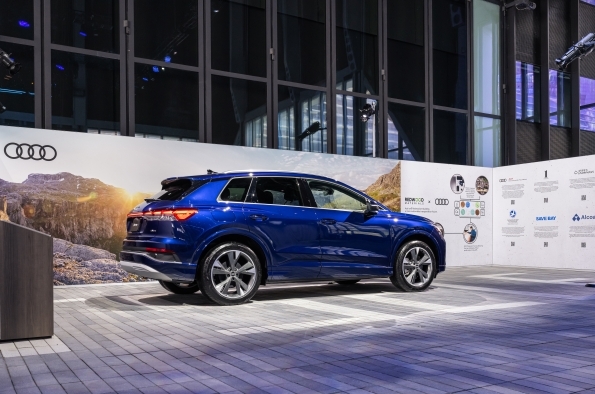- Audi is a founding partner of Greentech Festival, a sustainability conference that invites discussion on topics related to sustainable development, climate, and environmental protection
- Greentech Festival will make its first New York appearance on Sept. 15 and 16 at The Shed, a cultural center in Hudson Yards
- Audi Environmental Foundation awards two grants to U.S based environmental organizations: Save The Bay and the Chesapeake Bay Foundation.
NEW YORK, NY, Sept. 21, 2022 – Audi will participate in Greentech Festival New York on Sept. 15 and 16. This conference with international roots invites discussion on topics related to sustainable development, climate, and environmental protection. Audi is a founding partner of Greentech Festival and participated in Greentech Berlin earlier this year. The festival includes a variety of opportunities for conversation among participants including open forums, panel discussions, keynote speeches, and bootcamp sessions.
“The Greentech Festival in New York is the prime setting for Audi as it allows us to exchange ideas with people that are working to find and implement solutions to reach ambitious climate goals,” said Tara Rush, chief marketing officer, Audi of America. “For real change to be made, innovative solutions need to be discussed, and I’m proud that Audi is a founding partner of a forum that gives a platform for these conversations.”
Audi will host a fireside chat on the main stage, along with a bootcamp session facilitated by Spencer Reeder, Audi’s director of Government Affairs and Sustainability, that conference participants can sign up to join. The all-new Audi Q4 e-tron will be on display at the brand’s exhibition space where Audi will also highlight its recent sustainability initiatives and efforts including:
Audi Environmental Foundation: Awards two grants to environmentally-focused organizations
The Audi Environmental Foundation recently awarded grants to two separate environmentally-focused organizations: Save The Bay and the Chesapeake Bay Foundation. Save The Bay, employs novel techniques and enlists community volunteers to restore tidal marsh habitat, including levee regrading, revegetation, and their innovative monitoring program. The grant will support their work protecting and restoring the San Francisco Bay for the benefit of both people and wildlife.
The grant for the Chesapeake Bay Foundation, a non-profit organization based in Annapolis, Maryland, will support their work of implementing science-based solutions that aim to reduce and reverse pollution degrading the Chesapeake Bay and its rivers and streams, including innovative techniques to reintroduce nearshore oyster beds providing both sea level rise resilience and local water quality benefits. The greater Chesapeake Bay region is home to 18 million people and 3,000 species of plants and animals.
Audi of America and Redwood Materials create domestic supply chain for EV battery recycling
Audi of America and Redwood Materials are working together to create a supply chain to recycle Audi electric vehicle batteries in the United States, as part of a larger partnership with Volkswagen Group of America. The new EV battery recycling collaboration will be facilitated by VWGoA’s nationwide network of approximately 1,000 dealers, starting with the Audi and Volkswagen brands.
Audi has one of the largest and most robust fully electric model lineups, including the e-tron SUV, e-tron Sportback, e-tron GT/RS e-tron GT, and the Q4 e-tron/Q4 e-tron Sportback, making a premium all-electric future, a reality today. By allowing for more sustainable utilization of battery components from the moment vehicles leave the assembly line through the end of their lifecycle, the collaboration can support local battery capacity and expertise as Volkswagen continues its transition towards an electrified portfolio.
Exploring supply chain circularity with recycled auto glass
Audi is seeking new opportunities for circularity, with potential application in its Q4 e-tron production line, by evaluating the use of recycled auto glass as a principal input into the fabrication of new windshields. The idea is to introduce irreparable auto glass as one of the raw materials used in new windshield glass manufacturing. The defect glass would be crushed and processed through a materials separation stage and then input into the fabrication process. This approach offers the potential to reduce CO2 by up to 30 percent and water use by up to 90 percent in the production of glass for windshields.
Mission:Zero – Audi’s goal to reach net carbon neutrality by 2025 at production sites
In support of the brand’s overall climate change and resource conservation goals, AUDI AG has implemented the Mission:Zero program. The program focuses on the following four action areas to achieve more sustainable production: decarbonization, water usage, resource efficiency, and biodiversity. Substantial strides have already been made toward these goals, including Audi Hungary reaching net carbon neutrality in 2020 and prior to that, in 2018, Audi Brussels becoming the one of the world’s first certified net-carbon-neutral vehicle assembly plants.











